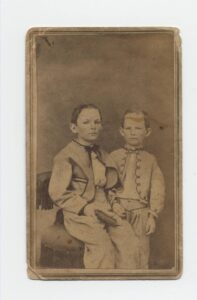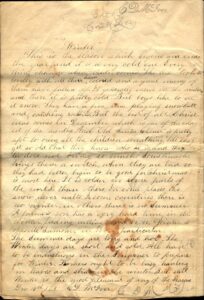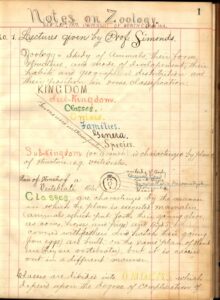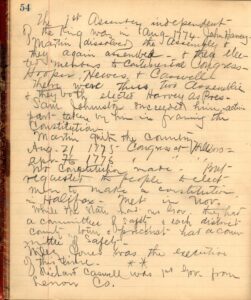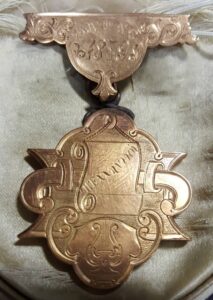The founder and first president of our university, Charles D. McIver, left a wealth of information behind when he died suddenly in 1906 on a train returning from Raleigh to Greensboro. Among his more formal papers dealing with his work as president of the school are also included diaries, school note books, and reminiscences of his life. From these, it is possible to get a better understanding of McIver’s education in Reconstruction era North Carolina.
Charles D. McIver was fortunate to have been born into a family well enough off, that he was able to enjoy an early education that was decidedly better than many North Carolinians had access to at that time. Charles’ first teacher may have been his father, Henry (Matthew Henry McIver, always referred to as “Henry”). Although from a wealthy family, Henry’s own father needed him on the farm and thus, Henry never attended college. Despite this, Henry was compelled by his neighbors to teach at the local one room school house. When Henry went to teach, he brought along his four year old son, Charles. Charles would later recall that school house as among his earliest memories.
Despite never having attended college, Henry and his wife, Sarah, always encouraged their children to go to college. “My father and mother reared me to the idea that, as a matter of course, I was to go to college,” McIver would later recall.
By the age of eight, Charles was ready to properly go to school. This time, however, Henry and his cousins hired a “proper” teacher. Bertha Buie, a sixteen year old graduate of Salem Academy was Charles first formal teacher. Charles would learn from textbooks such as McGuffey’s Reader or the North Carolina Reader. McIver also remembered other teachers from this period. Mary Newby particularly helped to see his education through to the age of thirteen.
From age thirteen to sixteen, Charles was taught by Davidson College graduate (and cousin) John E. Kelley. The subjects taught during this time were appropriate for a student who sought to enter college- English, geography, algebra, Latin and Greek.
With his Presbyterian roots and connections, it would have been entirely natural for Charles to attend Davidson College, but he instead chose the University of North Carolina, partly because it had produced so many leaders in the state, but also because he wanted something a little outside of his upbringing.
The entrance requirements for UNC were stringent:
“A competent knowledge of the elements of the English language, Geography, and Algebra through equations of the second degree, Latin Grammar, Prosody and composition, four books of Caesar, five books of Virgil’s Aeneid, or the equivalent in Ovid, Sallust, or Cicero’s orations; of Greek Grammar and Composition, four books of Xenophon’s Anabasis, or Memorabilia, and two books of the Iliad.”
Charles was well prepared by his schooling under John E. Kelley and entered UNC in the fall of 1877 at age sixteen. Although his family was decidedly not poor, he was forced to borrow money from his uncle to pay for tuition and expenses (Tuition was 60 dollars, Room rent was 10 dollars/year at UNC during this time). McIver later stated that his total tuition debt for attending UNC was $1,200 dollars.
Charles enrolled in the A.B. (Bachelor of Arts) degree, and being well served by the course of education taught by Kelley, was a very good student, scoring above 90 in every subject in his first two semesters. Indeed, he did so well, that he would later earn a medal for Greek in 1879. If Charles had one failing at UNC, it was his inability to speak publicly. As he would later relate, “During my four years at this institution I made no appearance before the public as a speaker when the payment of fines…could relieve me from that duty.” Fortunately, Charles would later overcome that deficiency in the course of time.
Charles would graduate in 1881 among the highest in his class, all the more notable in that his classmates included many future NC leaders.
Charles would graduate in 1881 among the highest in his class, all the more notable in that his classmates included many future NC leaders.
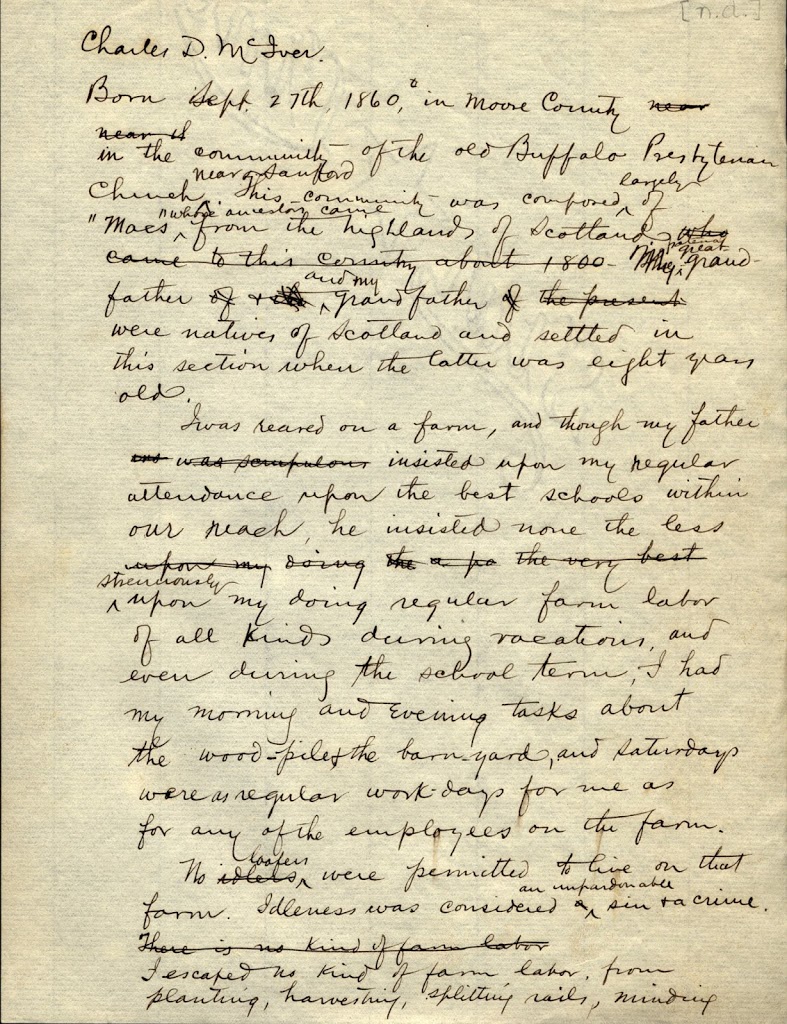 |
| One example out of many of Dr. McIver’s reminiscences concerning his early life and education, undated |
*In addition to the Charles Duncan McIver Records, 1855-1906 (UA2.1), the books: McIver of North Carolina by Rose Howell Holder & Covert Curriculum by Pamela Dean were also consulted in the creation of this blog post.
By Scott Hinshaw
